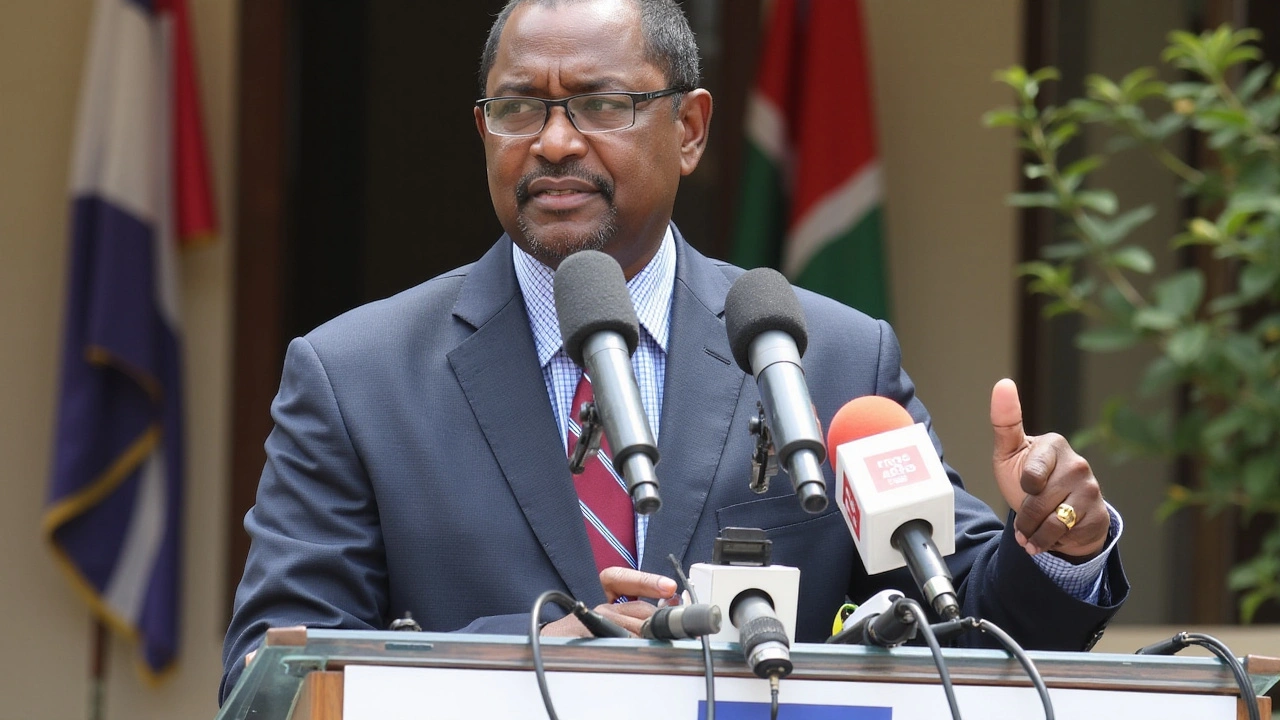
Kalonzo Musyoka Stands Against Security Withdrawal
In a recent development that has stirred the political landscape of Kenya, Wiper party leader Kalonzo Musyoka has openly denounced the reported withdrawal of security detail assigned to Chief Justice Martha Koome. In what he described as an outright violation and threat to the judicial independence of the nation, Kalonzo urged the immediate reinstatement of her security team. His statement reflects a deep concern over what is perceived as an infringement on the autonomy of judicial processes, a matter that touches the very heart of democracy and governance in Kenya.
Chief Justice's Protest and the Implications for Judicial Independence
The issue came to the forefront after Chief Justice Koome took the unusual step of writing a protest letter to Interior Cabinet Secretary Kipchumba Murkomen. In her letter, she did not mince words, expressing a grave concern that stripping away her security could lead to an imbalance of power within the government’s functional architecture. She emphasized the necessity of security for her role—not as a mere personal advantage but as an essential element for the judiciary to function without influence or intimidation. Chief Justice Koome’s alarm highlights an important discourse on the fragility of judicial independence in the face of political maneuverings.
Reactions from the National Police Service
Responding to these concerns, the National Police Service has denied any malfeasance or ulterior motive behind the security withdrawal. They claimed that the officers previously assigned to Chief Justice Koome were recalled strictly for promotional training, an administrative procedure that supposedly affects numerous officers across different branches. According to them, this was merely a standard protocol where officers were replaced temporarily as they underwent further training. Despite these assurances, skepticism and concerns continue to flourish, as stakeholders question the potential impact of such a withdrawal on judicial procedures and the perception of safety among judicial figures.
Legal Community and Public Response
The broader legal community, including prominent organizations such as the Kenya Magistrates' and Judges' Association (KMJA) and the Law Society of Kenya (LSK), have rallied in defense of Chief Justice Koome. Their collective voices have condemned the move, presenting a united front that underscores the critical importance of security for judicial personnel. They argue that any deviation from this principle poses an alarming risk to not only judicial independence but the entire foundation of law and order in the country. Legal experts warn that such a precedent could degrade public confidence in the fairness and impartiality of the judiciary, potentially paving the way for increased political influence in legal matters.
The Importance of Security in Judicial Functioning
At the heart of this issue lies the debate over the role of security in ensuring that judicial bodies can operate free from coercion and threats. Security for judicial offices is not merely a ceremonial aspect; instead, it is deeply tied to the ability of judicial figures to deliver decisions impartially and boldly, without looking over their shoulders. The withdrawal, therefore, brings to the fore a significant question: is the judiciary being subtly coerced under the guise of administrative reshuffling, potentially undermining their courage to uphold laws impartially? The need for clarity and transparency in addressing these adjustments is critical to maintaining the judicial sanctity within Kenya's political ecosystem.
Moving Forward: The Way Ahead
As tensions continue to simmer, there is a pressing need for open dialogue among the involved parties to demystify the withdrawal process and ensure that such actions are not perceived or used as tools for political leverage. Reassuring the public and the judiciary alike should be of utmost priority for the government, as these developments bear significance beyond individual roles—they affect the very reputation and functionality of Kenya's entire judicial system. Maintaining a robust, independent judiciary is pivotal for the progression and stability of any democratic state. The debate sparked by the security withdrawal will undoubtedly shape the future discussions of judicial independence and the vital structures that support it across Kenya.
10 Comments
Write a comment
More Articles

Celebrating Janmashtami 2024: Heartwarming Wishes, Profound Quotes from Bhagavad Gita, and WhatsApp Messages
Janmashtami 2024 marks the birth of Lord Krishna, an avatar of Vishnu, celebrated by devotees keen to seek blessings during an auspicious 45-minute window. This article includes timeless quotes from the Bhagavad Gita emphasizing self-discipline, duty, and spiritual resilience, as well as heartfelt wishes and messages to share with loved ones on WhatsApp.

Delhi Airport Terminal 1 Roof Collapse: Govt Steps In to Avoid Ticket Price Surge Amid Massive Flight Cancellations
The Ministry of Civil Aviation has instructed airlines to halt any potential price hikes following a roof collapse at Delhi Airport Terminal 1. The tragic event led to one death, six injuries, and over 80 flight cancellations by Indigo alone. Heavy rains precipitated the collapse, significantly impacting domestic travel plans.

OnlyFans Star Annie Knight Hospitalised After Record-Breaking Encounter With 583 Men
Aussie OnlyFans creator Annie Knight was hospitalised after an extreme stunt where she had sex with 583 men in six hours. The event, held at a swingers club with heavy security, sparked health issues but Knight insists she'll keep producing content despite the risks.
manish mishra
January 24, 2025 AT 22:02They’re playing chess, not politics 😏. Pulling security from the chief justice is just another move in the grand game of power, and Kalonzo is calling it out because he sees the pattern. If the state can strip protection on a whim, what stops them from doing the same to any independent body? It’s a slippery slope that threatens the whole rule‑of‑law.